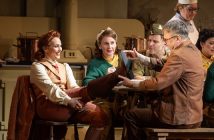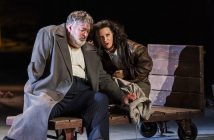In an interview in 2015, the Royal Opera’s Music Director Antonio Pappano said there are three operas he doesn’t let anyone else conduct in his house. ‘They’re just very personal. It’s not that there aren’t people who can do them better, I’m sure they are…I just feel very strongly that those pieces are Music Director pieces.” The three operas were – Tristan und Isolde, Werther and Otello.
Verdi’s take on Shakespeare’s play certainly has plenty to recommend it. It’s tight, focussed and plot-driven and has some glorious music, for the soloists, chorus and orchestra alike. Verdi, by this point, had reached a new level in his writing and, particularly, orchestration that has a wonderful range, depth and darkness. It’s an opera of huge power, yet with subtle, intimate moments.

Maria Agresta as Desdemona in Otello
Of course, when you have a tenor of the calibre of Jonas Kaufmann in the title role, you’ve got a force to be reckoned with too. Despite countless offers to sing the role, Kaufmann waited till he felt he was ready, not just vocally but emotionally, for the part. Based on this first outing he could become the Otello of his generation.
But Otello is far from a star vehicle. It’s very much an opera with three leading roles. Indeed, through most of the period Verdi worked on it, he was planning to call the opera Iago. It requires three superb acting singers, which this production most certainly has. Marco Vratogna’s snarling, brutish Iago and Maria Agresta’s beautifully clear Desdemona are far from supporting roles. And Kaufmann himself is superb, vocally, physically and dramatically.

Frédéric Antoun as Cassio in Otello
And yet…there’s something missing. It’s not the singing, the acting, the direction – certainly not the wonderful conducting. The staging is on the stark side, apart from a couple of weird costume choices and an utterly baffling enormous statue of a lion that is wheeled on only to re-appear in pieces. It’s unsubtle at times, but that doesn’t detract from the drama.
What’s absent is a depth of emotional, psychological drive underpinning the action. Why is Otello so quick to believe Desdemona’s infidelity and jump straight to the conclusion he has no option other than to kill her? We see the intensity with which Carmen provokes Don Jose, to the point he simply snaps. We feel the terrible forces pulling Wotan apart when he imprisons Brunnhilde on her rock, surrounded by fire. But how does Iago’s rumour mongering set in such swift motion this terrifying juggernaut of inevitability?

Jonas Kaufmann as Otello and Marco Vratogna as Iago in Otello
And juggernaut it is. This is no crime of passion, it’s a brutal cold-blooded murder. Yet, although acts I and II might lack a little depth of character, once the first domino topples, the relentless ascent to dizzying heights of horror is astonishing. It’s act III that lights the fuse. It’s one of those pivotal operatic acts that doesn’t contain the hits, but holds the real psychological heart of the drama – like Act II of La traviata, or act III of La bohème. From here on in it’s a terrifying ride.
Ultimately Otello is an opera that leaves you crushed, rather than swept away. A work to marvel at and stand in awe of, rather than to love. Don’t get me wrong, this is a masterful production of an excellent opera, on almost every level. Go and see it if you can, and if not look out for the BBC Radio 3 broadcast this autumn. I will.
Otello at the Royal Opera House until 15th July 2017. For more information and tickets please visit the website.




